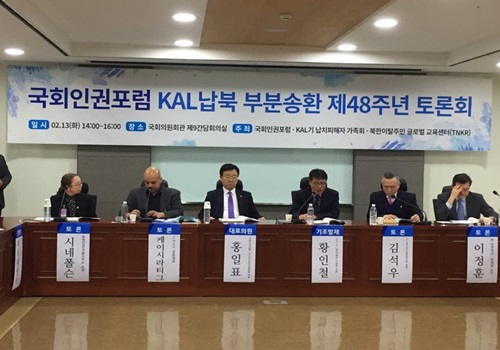Leaders from the human rights community in Seoul have been calling attention to continued human rights violations being committed by the North Korean regime, pushing back against the North’s latest “peace offensive” surrounding the Pyeongchang Olympics and the South Korean government’s warming attitude towards the North.
On February 13, a panel discussion sponsored by Teach North Korean Refugees (TNKR) was held at the National Assembly, commemorating 48 years since the hijacking of Korean Airlines (KAL) flight YS-11 and the subsequent abduction of its passengers in 1969.
“We are in a situation now where North Korea’s crimes against humanity are being forgotten amidst the North’s participation in the Pyeongchang Winter Olympics and thawing relations with the South,” Yonsei University Professor and former Ambassador for Human Rights Lee Jung Hoon said at the event. “It is imperative that we employ a multifaceted approach to secure the repatriation of the KAL passengers (that are still held by North Korea),” he continued.
On December 11, 1969, KAL flight YS-11 carrying 4 crew members and 46 passengers took off for Gimpo Airport near Seoul from Gangneung on the east coast, but was hijacked by a North Korean operative and flown into North Korea. Thirty-nine of the kidnapped passengers were returned to the South on February 14, 1970, but 11 have been held by North Korea, their fate unknown to this day.
Tuesday’s panel discussion involved participants advocating for the repatriation of these remaining abduction victims, supported by material from the findings of the UN Commission of Inquiry on human rights in North Korea (COI).
Hwang In Cheol, one of the KAL passengers who was returned and a representative of the group for hijacking victims and their families, was the keynote speaker at the event. “While the South Korean government technically considers the abduction victims to be in the ‘divided families’ category and has requested their attendance at family reunions, they allow the North to get away with simply saying they ‘cannot confirm the status’ (of the remaining 11 people), without any consequences,” Hwang said in his speech. “The South Korean government is refusing to put pressure on the North Korean authorities over the issue of these victims.”
Another panel member, Director of the National Development Institute Kim Seok Woo, criticized the South Korean government for failing to fulfill their duty. “The UN COI has confirmed that North Korea engaged in systematic, organized abduction schemes, which constitute grave human rights violations,” Kim said. “It is our government’s responsibility to place the appropriate pressure on the North Korean authorities to acknowledge their crimes.”
“US President Donald Trump recently emphasized North Korean human rights abuses during his State of the Union Address, and Vice President Mike Pence has also focused on addressing their violations, meeting and talking with defectors face-to-face,” Kim continued. “The South Korean government must similarly demand an end to the North’s human rights abuses and strongly pressure the North to repatriate the KAL abduction victims.”
Highlighting what they call the passive attitude of the South Korean government on the issue, participants pointed to the Japanese government’s more proactive efforts to recover their abducted citizens from North Korea.
“While the role of international organizations such as the Red Cross is vitally important, the government’s will and actions are the most important factor,” Professor Lee said, pointing to the example of the Organization for Abductions of Japanese Citizens by North Korea, operating under the Japanese government.
This organization is headed by Japanese Prime Minister Shinzo Abe and involves all of the government’s top department ministers working together to solve the problem of the kidnapping of their country’s citizens by North Korea.
Lee applauded the Japanese government’s management of the organization and noted that it “is able to form a comprehensive policy on kidnapping victims and aggressively campaign for their cause to the international community.”


















